Many players head to the blackjack tables, determined to finally win. Most of them have solid knowledge and a good strategy but still somehow don’t manage to achieve the desired result. It is true that these two factors play a crucial role for their performance. However, they are not enough if players want to become consistent winners.
Along with them, it is compulsory to set clear loss limits and win goals and be able to manage their bankroll successfully, otherwise they are bound to lose everything they have. It is worth mentioning that the casino will always have an advantage over the basic strategy players even before they have even started playing.
It is built in the game and after all, this is the reason why casinos offer the game in the first place. Thus, it is not only wise to have money management but also compulsory if players want to master the game and win in the long term.
What Is Money Management
Money management is a necessity for many reasons in all spheres of life. Many businesses, regardless of their type and size, cannot function without it as it is one of the key requirements for success. The same applies when playing blackjack as the right strategy for money management can really work wonders. There is no universal plan for it and it will be best if players take their time to think this important matter through.
Moreover, every gambler has a different bankroll and thus, it will be most beneficial for them to create the plan themselves as they best know their needs and expectations. Money management and discipline prevent players from being imprudent with their money in the casino and help them make better choices during the game.
It works the same way as any other strategy as it gives them the opportunity to prepare themselves beforehand and determine their bets in accordance with their bankroll. Money management is all about the bankroll players bring with themselves and what the best way to bet in a particular situation is.
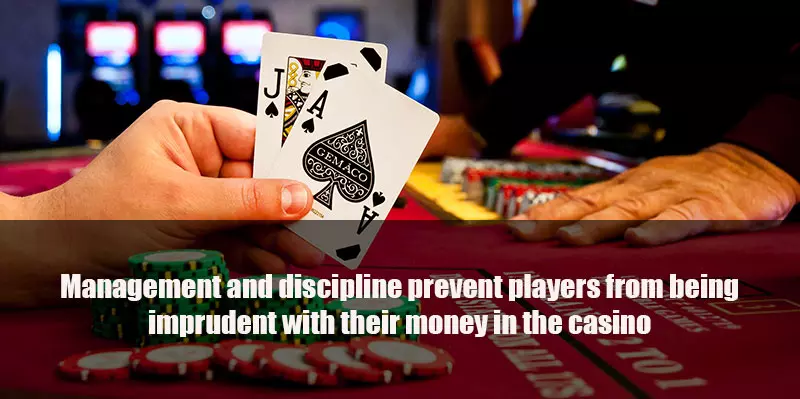
Reasons to Follow Money Management
As previously indicated, having money management skills is really important as it helps players stay away from spending all of their funds in the blink of an eye. It is extremely simple to get in debt in the casino nowadays as many operators offer players the option to play online at a very fast pace.
Without money management, they don’t have any idea how to control their funds and losing all of them is just a matter of time. Not to mention that it is impossible for players to be consistent winners without such skills and discipline. This is the only way players can successfully manage their bankroll and make decisions that won’t leave them broke every time.
Moreover, thanks to it, they can determine the right amount of wagers they should make proportionately to their bankroll. Money management is also very important as it prepares players beforehand for the decisions they need to make regarding their bankroll and it prevents them from making bets based on their current feelings and emotions.
Splitting a Pair of 9’s
Splitting a Pair of 10’s
Dealer’s Up Card
Basic Strategy Money Management
Running True Count
Bankroll
The players’ bankroll is an inseparable part of the money management strategy. As already mentioned, it is crucial to set clear win goals and loss limits as this will help you determine when to leave the table. Players should update them on a daily basis as this way they will be able to get the best return for their money.
Basic strategists must bear in mind that blackjack is not a break-even game despite its negligible house edge. Players, who rely solely on basic strategy, inevitably play a losing game because they are at a disadvantage, albeit a negligibly small one. Because of this, it is crucial to be disciplined enough to walk away before critical situations occur and all of their bankroll are lost.
Determining the loss limits and win goals deserves special attention as they allow players to successfully manage their money and play without going completely broke. It is worth mentioning that discipline is closely connected to them. Without it, even if players have the good intentions to set up a money management plan, they are bound to fail.
Speaking of loss limits, players should learn to think in terms of base betting units rather than in terms of specific percentages or let alone, amounts. If your session bankroll drops below a certain level, you may no longer be able to play optimally and will have to deviate from correct basic strategy.
Here is an example of what we mean. Suppose you play standard six-deck blackjack with DAS, resplitting to four hands, and the S17 rule in effect. You have put aside a decent enough bankroll for the session and intend to flat-bet the table minimum of £5. Unfortunately, variance (call it luck if you will) is not on your side that day and your once-large starting bankroll diminishes to £10.
This sounds bad but it happens in blackjack as the latter is a highly volatile game. Next thing you know, you bet £5 of your last £10 and are dealt a pair of 3s against a 6, which calls for a split. You split correctly with your last £5 and pull a 7 on one of your hands for a hard 10 and another 3 on the other split. You need another £5 to double down on your hard 10 and yet another £5 to resplit the second pair of 3s. Catch a 6 for a hard 9 after you resplit and you need another £5 for a double down.
All in all, you need £20 to cover all these plays but you are already out of money so there is no other option but to sacrifice optimal strategy. Misplay your hands consistently enough due to lack of sufficient funds and you will surely add to your long-term losses. If you no longer have enough money to cover optimal strategy plays, you call it quits. This should be your loss limit.
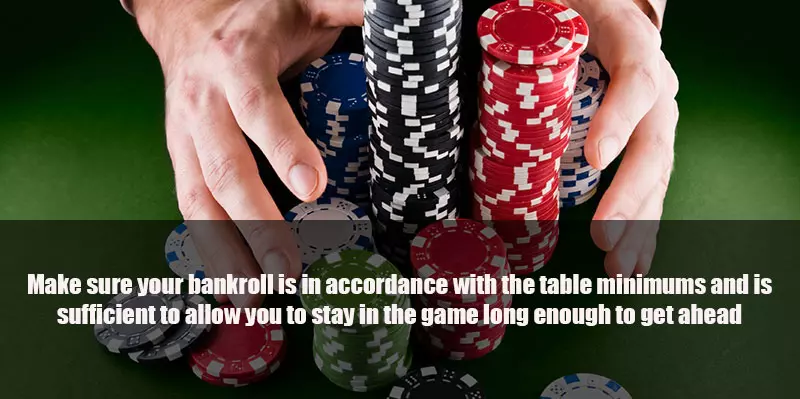
Importance of the Minimum Bet
Every table has a minimum amount of money players need to bet, established by the casino. It is really important for them to choose a table that will correspond to their bankroll as otherwise, their chances of winning are significantly decreased. For instance, if they come to the casino with a total of £150, betting at a table with a minimum of £5 might cause them to lose all of their money very quickly.
This is due to variance and the law of small numbers, two concepts all players should acquaint themselves with if they are serious about blackjack and gambling, in general. A distinction should also be made between probability and variance as the two are not the same thing.
If you flip a coin, the probability of it landing on either heads or tails is 1 in 2, or a 50% chance for each of the two outcomes over the long run. However, you cannot expect the coin to land exactly five times on heads and five times on tails every ten flips. This is due to variance.
The term variance denotes the discrepancy in gamblers’ long-term statistical expectation and their actual results in the short run. Superstitious players would describe this as “luck”. Due to variance, neither basic strategists nor advantage players can predict with 100% certainty whether they would win or lose during any given isolated round.
The best they can do is know when probability is in their favour so they can size their bets and play accordingly. Negative variance translates into losing streaks while positive variance manifests itself in the form of winning streaks.
When it comes to gambling, anything can happen in the short term, including grisly losing streaks that would wipe your entire budget out. A player should be properly bankrolled to survive the bad runs variance causes.
Respectively, the term maximum bet exists as well. As it hints, it is the maximum amount of money players are allowed to wager on a single hand. In fact, casinos use maximum limits as a form of short-term damage control since their edge requires an extended period to begin to manifest itself.
If a player sits down at a blackjack table and decides to bet one million pounds on a single hand (as reckless and improbable as this sounds), there is a good chance they could win in this one isolated case, even if they are dealt a lousy hand like hard 16 vs. a 10. The house would have no other option but to pay them, suffering massive losses from this hand alone. This is one of the primary reasons why the limits on maximum bets are in place.
In this sense, if players want to have more options to choose from, they need to enter the casino with a decent bankroll. The first thing they should look for is the minimum bet at the table. It is really important not to rush to join the game but instead take your time to evaluate the playing conditions and build up a large enough bankroll before you sit down to play.
As for the exact bankroll you would need, this is all very relative since the amount should be based on the table limits and what size of bets you intend to make. Many gambling experts, including author and world-class blackjack player Henry Tamburin, recommend a bankroll of 100x your minimum wager.
By that we mean the minimum you intend to bet, not the minimum of the respective table. So if you pick a £5 table but intend to flat bet £10 per hand, your optimal budget should be at least £1,000, not £500. Blackjack is a game of excruciating variance and you will be unable to withstand it if you are underbanked. You need enough money to survive the potential downswings.
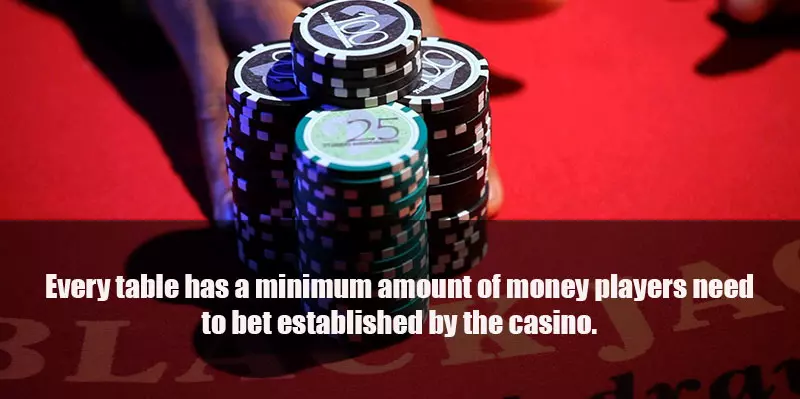
More Tips That Help Basic Strategy Players Preserve their Bankrolls
Money management is important regardless of whether one is playing blackjack recreationally or professionally. And so is having knowledge of the game. If a player lacks in these two aspects, they are more than likely to part with their money. So here are a few more tips that can help you preserve your blackjack budget for longer and reduce your long-term losses.
Explore Online/Landbased Casinos for the Best Playing Conditions
Scouting the tables is one of the most essential things basic strategy players must do if they are looking to preserve their bankrolls for as long as possible. Both online and terrestrial casinos tend to offer a profusion of blackjack tables.
There are single-deck and double-deck variants of 21, shoe-dealt games, games where blackjacks pay even money and players cannot resplit. The dealers at some tables would hit soft 17 (H17) while at others, they would stand on this soft total (S17).
Now, how does this relate to money management and bankrolling? The answer is simple – each ruleset yields a different house edge percentage and requires a specific strategy. Because of this, it is crucial for players to scout for the games that offer them the most liberal playing conditions.
The better the rules, the lower the house edge. The lower the house edge, the slower it will drain your blackjack bankroll. One example of a player-favourable blackjack variation to try is a six-deck hole-card S17 game with late surrender, DAS, doubling on any two cards, and blackjack payouts of 3 to 2. The house advantage under this ruleset is roughly 0.36% with correct basic strategy.
It would be more expensive to play single-deck ENHC H17 blackjack without surrender, DAS, and doubling restricted to two-card 10 and 11 only. One such game would have a house edge of 0.54%. Throw in the 6-to-5 reduction in the blackjack odds and you give up a heart-breaking 1.39% in favour of the casino. Our advice is to avoid such poor playing conditions unless you want to lose your shirt.
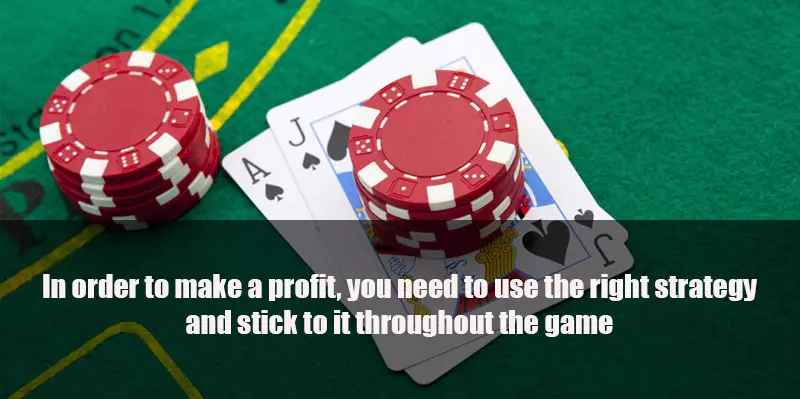
Play at Full Tables Only
Players who intend to use nothing but basic strategy are better off joining full tables when playing at landbased casinos rather than scouting for empty ones. Playing against the dealer heads up is even worse. Remember that the house always has a slight advantage over players even if they make the accurate strategy moves at all times.
Playing at full tables is recommended to basic strategists because it decreases the number of hands they play at a disadvantage per hour. When there are other patrons at the table, your bankroll will not be as exposed to the house edge, compared to sitting at an empty table.
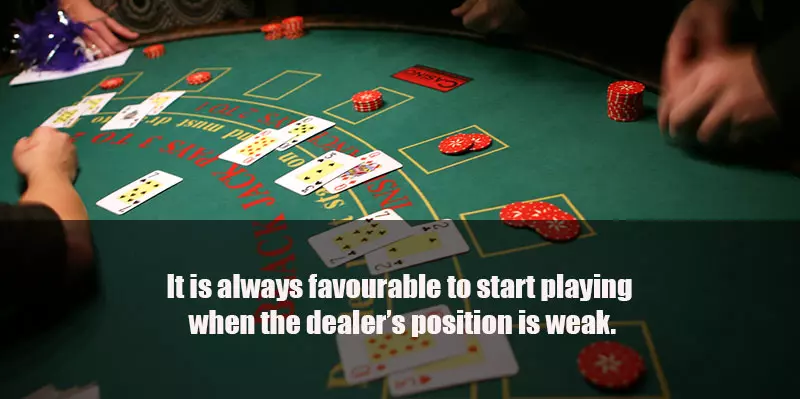
Avoid Playing against Continuous Shuffling Machines
This is an extension of our previous tip with the full tables. We advise players to pay attention to how the cards are shuffled before they sit down at any given new table. Pitch games in landbased casinos are normally hand-shuffled but offer poor playing conditions in most cases.
Shoe games, on the other hand, are often shuffled by a machine because shuffling multiple decks manually is a strenuous task. This saves time and increases the house’s take from the blackjack tables because players end up going through a greater number of rounds each hour.
Two types of machines are usually implemented in shoe-dealt games, automatic and continuous shufflers. The house edge against basic strategists does not change whenever the cards are shuffled by an automatic shuffling machine (ASM).
However, basic strategy players should do their best to stay away from Continuous Shuffling Machines (CSM) if possible. Many of these are also implemented at live dealer casinos on the web so keep that in mind, too.
The saying “time is money” rings particularly true where machine-dealt blackjack is concerned. The trouble with continuous shufflers is that they serve a two-fold purpose. On one hand, they shuffle the packs, on the other – they are used as blackjack dealing shoes.
The dealers at CSM tables collect the discards at each round’s end and feed them back into the machine which reshuffles everything at random. This is kind of like what Random Number Generators do in online blackjack.
Not only does this deter card counters since it gives them almost no penetration but it harms basic strategy players, too. CSM-shuffled tables generate non-stop action since there is no natural pause in the game a manual reshuffle would have caused.
Unlike automatic shufflers, CSMs do impact the house edge players face. The funny thing is this type of machine actually reduces the casinos’ advantage because it causes a minuscule increase in the odds of receiving ten-value cards and naturals.
However, this small reduction in the casino edge is completely overturned by the faster pace of the game that results from using continuous shufflers. This translates in more hands per hour played at a disadvantage, which, in turn, leads to greater hourly losses for the patrons who rely on basic strategy only. You can preserve your bankroll for a longer period if you avoid such machine-dealt games.
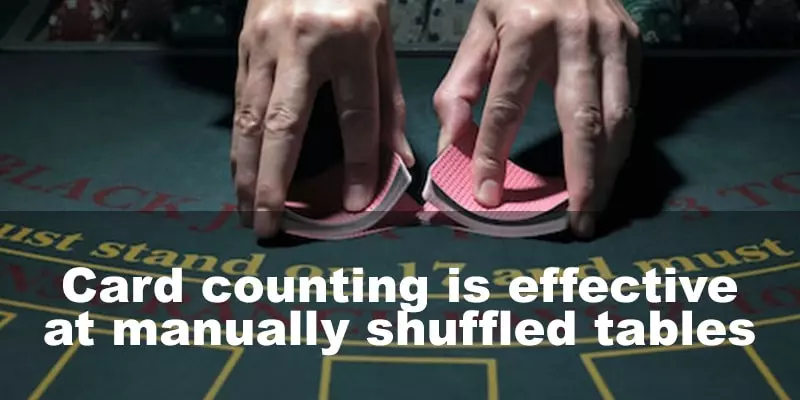
Steer Clear of Progressive Betting Systems
It is common for many casual players to use the so-called progressive betting systems, which normally require you to size your wagers depending on whether you have lost or won the previous hand. There is an abundance of such “strategies” online as well as in printed literature, but they are generally grouped into two main categories.
Some systems use negative progressions, in which case, the player is bound to up wagers after they lose a hand and reduce them after they win a hand. By how many units these reductions and increases occur is system-specific. Others are built around positive progressions where the opposite happens, i.e. you up your wager once you win and size it down when the dealer defeats you.
The trouble with such systems is that they are harmful to blackjack players for a variety of reasons, the first one being they do nothing to reduce the house edge or improve your winning odds. Furthermore, they require players to size their wagers based on previous outcomes.
Unfortunately, previous results have zero bearing on what is going to happen in the future provided that one uses only basic strategy. While theoretically effective, many of these systems perform very poorly in real-life conditions due to the imposed table limits and the steep betting ramps they require.
Players who use them often end up betting recklessly, depleting their entire session bankrolls after a few losing rounds. If you want to size your wagers at the blackjack table, you should do so in line with your advantage by learning how to count cards.
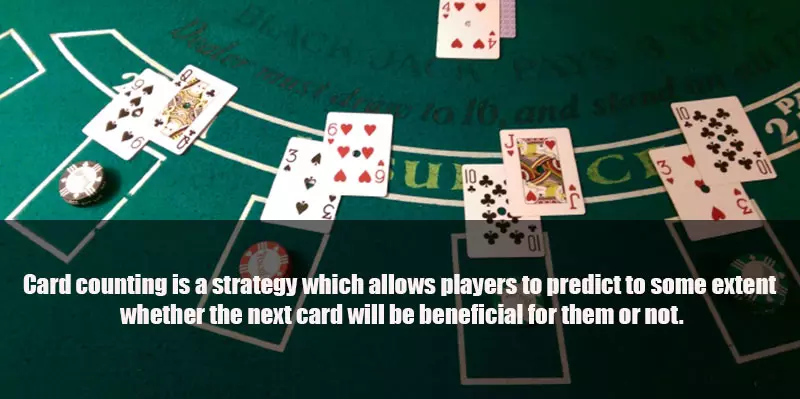
Always Stick to Basic Strategy
Blackjack novices should bear in mind following basic strategy at all times is a form of money management by itself. While basic strategists are still playing a losing game, their bankrolls will surely suffer less long-term damage because the strategy causes a significant slump in the house edge.
In turn, this reduces the negative expectation basic strategy players are facing. Those who play each hand optimally at a consistent basis are up against a house edge of 0.50%, sometimes even less under more liberal house rules. Haphazard play based on what “feels” right causes a surge of at least 1.50% in the house advantage.
Basic strategy can be treated as a form of money management because it cuts down the losses players suffer from negative-expectation hands. To boot, it increases players’ winning chances in some situations and allows them to generate greater profits when at an advantage.
These characteristics of basic strategy help disciplined players to preserve their blackjack bankrolls for a longer period compared to people who play on hunches. It is not surprising basic strategy is used as some sort of a benchmark when auditors estimate the house edges of different online blackjack games.
The RTP (Return to Player) and house edge percentages listed in the Info sections of online blackjack variations assume one follows basic strategy consistently. The percentages grow higher without the strategy. So keep in this in mind the next time you sit down to play blackjack. Strategy charts are readily available both in specialized blackjack literature and online at no cost.
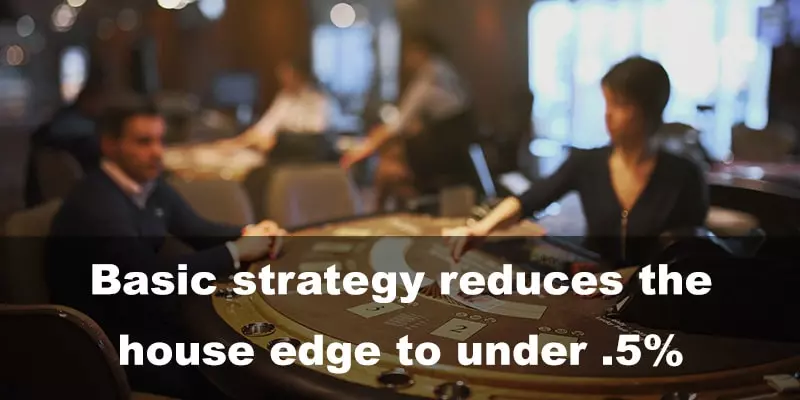
Money Management is Essential for Advantage Players
Money management is a crucial component of the career of all blackjack advantage players, i.e. card counters. At the beginning of this guide, we explained blackjack is a game of depending trials. Thus, the advantage swings back and forth between the player and the house depending on the ratio of high to small cards that remain unplayed.
Statistically it makes sense for such skilled players to up their wagers whenever the remaining deck or shoe contains a greater number of high-value cards (K, Q, J, 10, Ace) as this is when the odds tilt in their favour. This is the time to press your bets. The opposite applies whenever the ratio of high-to-low cards drops.
It is essential for successful advantage players to manage their blackjack bankrolls properly since this helps cuts their losses and increases their profits. Advantage players use the so-called betting spreads (or ramps) to size their bets proportionately to their edge, a technique known as Kelly betting.
Said edge depends on the current count per undealt deck, aka the true count (TC). You can read more on this subject in CasinoGuardian’s article Introduction to Card Counting. For the moment, it suffices to say the choice of a bet spread depends on many different variables including table limits, bankroll size, playing conditions, and penetration, i.e. how deep a dealer goes into a shoe before they reshuffle the cards.
The advantage of a card counter begins to manifest itself at a positive true count of 1, but this is also influenced by how liberal house rules are. A positive 1 yields an edge of around half a percent for the player, which means you are playing a break-even game at this stage.
The player’s edge increases by half a percent for each one-unit increase in the true count. In turn, the card counter would increase their bets proportionately to the rising true count. They would bet the minimum or nothing at all at a count of zero and below and press their action the more the count increases.
So, for example, if you are using a 1 to 5 betting spread, you should wager the minimum of one unit on a count of +1, two units on a count of +2, three units on a count of +3, four units on a count of +4, and a maximum of five units when the count reaches +5 or above.
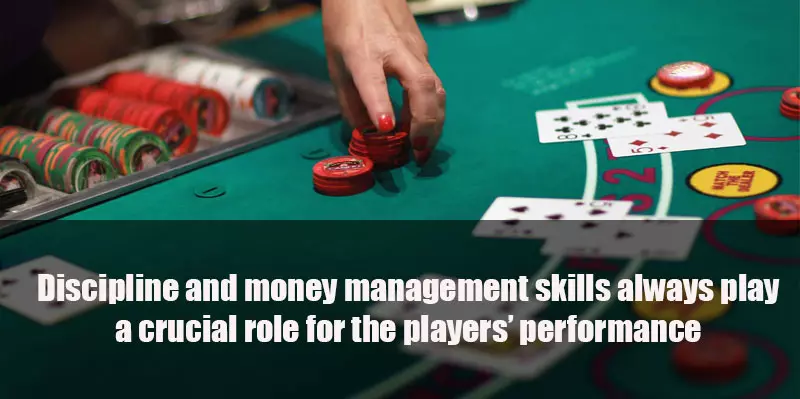
Conclusion
The bottom line is that having money management skills are just as important as using the basic strategy correctly. Without them players certainly won’t be able to become consistent winners no matter how hard they try. Along with good discipline and decent bankroll, money management is one of the requirements players need to meet if they want to win.
It is really important for them to be able to determine successfully the amount of money they need to bet when they win or lose in order to control their funds. It also helps players make better decisions when to reduce their money wager and withdraw from the table. By preparing beforehand and thinking through how to bet in every possible situation, they significantly increase their chances of winning the game.